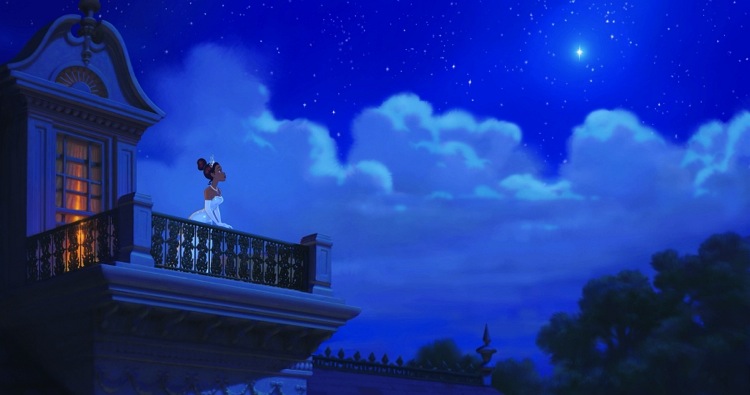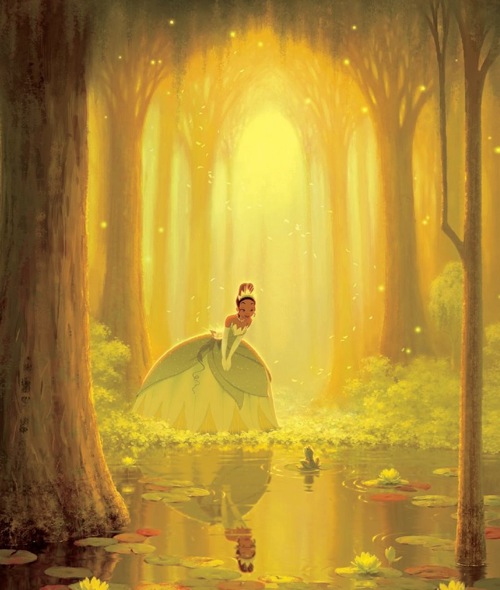
By David Ross. The Pixar-Disney partnership, about which I was initially skeptical, now seems all to the good. Pixar remains exuberantly creative, while Disney has absorbed some of the lessons of Pixar, the most basic of which is that kids have better instincts as well as worse instincts, and that there is plenty of money to be made by appealing to the former. My recent discussion of kids movies made no mention of Disney’s The Princess and the Frog (2009) because I had not yet seen it, but my little family had a rollicking time with it last night. I would call it Disney’s best film since The Fox and the Hound (1981), the last film to exhibit something, if only a shadow, of the old charm and simplicity. Coming on the heels of Bolt (2008) – Disney’s most successful Pixar rip-off attempt – The Princess and the Frog seems to signal that Disney has finally found the light at the end of its long tunnel of malaise, incompetence, condescension, and small-mindedness, otherwise known as the Eisner era.
The Princess and the Frog offers plenty to like. Instead of rounding up celebs to phone in the usual tired voice work (v. Mel Gibson in Pocahontas and Demi Moore in The Hunchback), Disney put together a low-profile but vibrant cast led by Anika Noni Rose as Tiana and Jenifer Lewis as Mama Odie. The acting is focused and energetic throughout, giving the entire film an air of personality and emotional engagement that recalls the films of Disney’s golden age (Ed Wynn as the Mad Hatter, etc.). Meanwhile, Randy Newman’s soundtrack, a pastiche of New Orleans jazz and zydeco, lends the film what all recent Disney films have lacked: bounce. While it is not going to convince anyone to throw away their old Clifton Chenier records, the soundtrack is a lark, and a welcome reprieve from the pop-Broadway syrup that dominated Disney’s dark age.

Unlike so many Disney films, whose higher-order thought is limited to misty sentimentalities about ‘being true to your dreams,’ The Princess and the Frog has a practical, insistent moral point. Tiana is indeed ‘true to her dream’ of opening a swanky restaurant, but the film makes it very clear – as clear as a parent could wish – that relentless hard work and delayed gratification are the key. Tiana marries the prince and gets her restaurant in the end, but she was destined to get her restaurant without magical intervention or princely subvention: she’s been working double-shifts as a waitress and saving her whole life and has nearly enough socked away. The disinherited prince meanwhile is re-inherited only because he’s been reformed by Tiana’s example of exertion and responsibility. In a lovely little twist, she rescues him from poverty far more than he rescues her.
Where most Disney films pay merest lip service to the world in their eagerness to become theme park rides, The Princess and the Frog is firmly set in New Orleans. There is the inevitable voodoo subplot that verges on offensive caricature, but there are also cafes, street cars, beignets, gumbo, riverboats, wrought-iron balconies – all reminders that New Orleans is a real if wonderful place. This feel for the enchantment of the actual may be a trick learned from Pixar, which specializes in finding the extraordinary aspects of the most ordinary spaces (a kid’s room, a restaurant kitchen, a post-apocalyptic junk pile, an old guy’s house). The Princess and the Frog‘s evocation of New Orleans is not as sophisticated as Ratatouille‘s evocation of Paris, but it means well: it does, at bottom, want to celebrate a worthy reality.
There is finally the matter of race. Tiana, of course, is black, the daughter of a seamstress employed by the wealthy “Big Daddy” La Bouff (John Goodman in the film’s only star turn). The scenario is ripe for cliché and vapid, superfluous moralizing, but the film resists the worst temptations. It indirectly acknowledges the complex system of race and class that governs New Orleans, but does not insist on its place at the forefront of consciousness. This seems to me true to life: race and class may be structuring realities, but most of life is lived within the private spaces that we create for ourselves with whatever freedom we have at our disposal. We witness Tiana not attempting to smash or discredit the social order, but attempting, like a real person, to make a life for herself within it.
A caviler might argue that the film evades the crux of the racial issue by pairing Tiana with a dusky-skinned prince of make-believe geographical origin, thus sparing itself the need to confront issues of racial division head-on. This is a fair enough point, but, again, I think the film means well. It wants to suggest that blacks and whites may be together, and it finds a means of doing so without being either historically oblivious or acrimonious. Prince Naveen’s uncertain and seemingly shifting racial identity (South American? Eastern European? Middle Eastern?) allows the film at once to make the point and finesse the point. I consider this forgivable.
If I had to make a criticism, I would say that The Princess and the Frog, like the rest of Disney’s modern output, seems somehow an impersonal construct. The film is suppler and more entertaining and less timid than the usual construct, but Disney has yet to learn the most important lesson of Pixar, which is that genuine personality is the only blood that can exist in the veins of a movie.
Posted on July 5th, 2010 at 11:36am.
yeah, i’m glad you guys noticed this one because i loved it when it came out. what they do with new orleans is really great.
I would call it Disney’s best film since The Fox and the Hound (1981)
I’m not exactly a fan of the
arrogant jerkEisner tenure at Disney, but picking a post Walt picture from the “Mormon mafia” period as your fav seems a wacky take.Another excellent review David. Your writing is really outstanding. This is a charming film and great for kids.
“Tiana is indeed ‘true to her dream’ of opening a swanky restaurant, but the film makes it very clear – as clear as a parent could wish – that relentless hard work and delayed gratification are the key.”
This is a wonderful point to be making, David. Too many films today give children the vague advice of “going for your dream” or “being true to yourself” etc., and it’s such a cliche. Kids need to be given the practical, hard advice that will actually help them to succeed.
Boy, I could not disagree more regarding Pixar and Disney’s output. http://www.michaelbarrier.com/Commentary/Princess_and_Frog/Princess_And_Frog.html I’m more there. Musker and Clements get every other one right, I think, with Aladdin as their (and nearly Disney’s) feature-length peak.